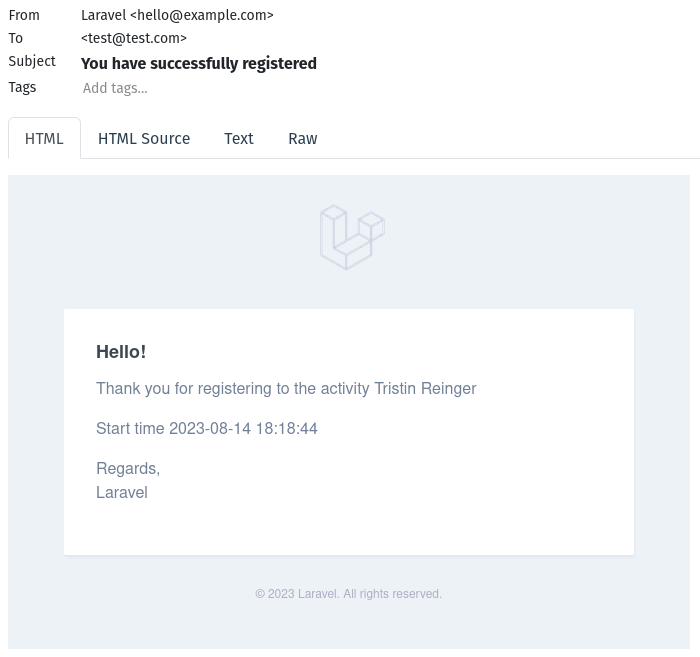Now that we show activities, we need a button to allow the user to register for an activity. If the user is a guest, he will first be redirected to the registration page and, after registration, will be registered to the activity. Then, after successful registration for the activity, user will be redirected to the My Activities page and will receive an email.
The Register to activity button will make a POST request. So, first, let's add this button to the show activities page above the thumbnail image.
resources/views/activities/show.blade.php:
// ...<div class="p-6 text-gray-900 space-y-3"> @if(auth()->user()?->activities->contains($activity)) {{-- [tl! add:start] --}} <div class="mb-6 bg-indigo-100 p-4 font-semibold text-indigo-700">You have already registered.</div> @else <form action="{{ route('activities.register', $activity) }}" method="POST"> @csrf <x-secondary-button type="submit"> Register to Activity </x-secondary-button> </form> @endif {{-- [tl! add:end] --}} <img src="{{ asset($activity->thumbnail) }}" alt="{{ $activity->name }}"> <div>${{ $activity->price }}</div> <time>{{ $activity->start_time }}</time> <div>Company: {{ $activity->company->name }}</div> <p>{{ $activity->description }}</p></div>// ...</x-app-layout>As you can see here, I also added an if-statement: we won't show a button if the user is already registered for the activity. But for this to work, we must add an activities relation to the User Model.
app/Models/User.php:
use Illuminate\Database\Eloquent\Relations\BelongsToMany; class User extends Authenticatable{ // ... public function activities(): BelongsToMany { return $this->belongsToMany(Activity::class)->withTimestamps(); }}When the user isn't registered for the activity, the expected result looks like this:

Otherwise, if the user is already registered, the expected result will look like this:

Next, we need a Controller and a Route.
php artisan make:controller ActivityRegisterControllerroutes/web.php:
use App\Http\Controllers\ActivityRegisterController; Route::get('/', HomeController::class)->name('home');Route::get('/activities/{activity}', [ActivityController::class, 'show'])->name('activity.show');Route::post('/activities/{activity}/register', [ActivityRegisterController::class, 'store'])->name('activities.register'); // ...In the Controller, we need to perform a couple of things:
register route with the activity as a GET parameter.My activities page with the success message.app/Http/Controllers/ActivityRegisterController.php:
use App\Models\Activity;use Symfony\Component\HttpFoundation\Response; class ActivityRegisterController extends Controller{ public function store(Activity $activity) { if (! auth()->check()) { return to_route('register', ['activity' => $activity->id]); } abort_if(auth()->user()->activities()->where('id', $activity->id)->exists(), Response::HTTP_CONFLICT); auth()->user()->activities()->attach($activity->id); return to_route('my-activity.show')->with('success', 'You have successfully registered.'); }}Let's quickly create a My activities page (blank for now) so that redirect would work.
php artisan make:controller MyActivityControllerroutes/web.php:
use App\Http\Controllers\MyActivityController; // ... Route::middleware('auth')->group(function () { Route::get('/activities', [MyActivityController::class, 'show'])->name('my-activity.show'); // ...});app/Http/Controllers/MyActivityController.php:
class MyActivityController extends Controller{ public function show() { return view('activities.my-activities'); }}resources/views/activities/my-activities.blade.php:
<x-app-layout> <x-slot name="header"> <h2 class="text-xl font-semibold leading-tight text-gray-800"> {{ __('My Activities') }} </h2> </x-slot> <div class="py-12"> <div class="mx-auto max-w-7xl sm:px-6 lg:px-8"> <div class="overflow-hidden bg-white shadow-sm sm:rounded-lg"> <div class="p-6 text-gray-900"> @session('success')) <div class="mb-6 bg-indigo-100 p-4 text-indigo-700">{{ session('success') }}</div> @endsession My Activities </div> </div> </div> </div></x-app-layout>For now, it will only show the text My Activities, and will show the success message if it exists.

Now let's get back to registering user to the activity, and let's create a Notification and send it.
php artisan make:notification RegisteredToActivityNotificationapp/Notifications/RegisteredToActivityNotification:
use App\Models\Activity;use Illuminate\Notifications\Notification;use Illuminate\Notifications\Messages\MailMessage; class RegisteredToActivityNotification extends Notification{ public function __construct(private readonly Activity $activity) {} public function via($notifiable): array { return ['mail']; } public function toMail($notifiable): MailMessage { return (new MailMessage) ->subject('You have successfully registered') ->line('Thank you for registering to the activity ' . $this->activity->name) ->line('Start time ' . $this->activity->start_time); } public function toArray($notifiable): array { return []; }}app/Http/Controllers/ActivityRegisterController:
use App\Notifications\RegisteredToActivityNotification; class ActivityRegisterController extends Controller{ public function store(Activity $activity) { if (! auth()->check()) { return to_route('register', ['activity' => $activity->id]); } abort_if(auth()->user()->activities()->where('id', $activity->id)->exists(), Response::HTTP_CONFLICT); auth()->user()->activities()->attach($activity->id); auth()->user()->notify(new RegisteredToActivityNotification($activity)); return to_route('my-activity.show')->with('success', 'You have successfully registered.'); }}The mail message looks like this:

Now that authenticated users can register for the activity, let's implement registration for guests.
We have already made the redirect to the register page. I think we can use Sessions again to automatically register to the activity as we did with the invitations.
First, we need to set the session.
app/Http/Controllers/Auth/RegisteredUserController.php:
class RegisteredUserController extends Controller{ public function create(Request $request): View { // ... if ($request->has('activity')) { session()->put('activity', $request->input('activity')); } return view('auth.register', compact('email')); } // ...}And then, after the submit button is clicked, we need to:
My activities route with the success message.app/Http/Controllers/Auth/RegisteredUserController.php:
use App\Models\Activity;use App\Notifications\RegisteredToActivityNotification; class RegisteredUserController extends Controller{ // ... public function store(Request $request): RedirectResponse { // ... $activity = Activity::find($request->session()->get('activity')); if ($request->session()->get('activity') && $activity) { $user->activities()->attach($request->session()->get('activity')); $user->notify(new RegisteredToActivityNotification($activity)); return redirect()->route('my-activity.show')->with('success', 'You have successfully registered.'); } return redirect(route('home', absolute: false)); }}After registering to the activity, we should be redirected to the My activities page with the success message.

And now the last part of every lesson: tests. We will test the following:
My activities page.Register page with the correct GET parameter.My activities page.php artisan make:test RegisterActivityTestapp/Tests/Feature/RegisterActivityTest.php:
use Tests\TestCase;use App\Models\User;use App\Models\Activity;use Illuminate\Support\Facades\Notification;use Illuminate\Foundation\Testing\RefreshDatabase;use App\Notifications\RegisteredToActivityNotification; class RegisterActivityTest extends TestCase{ use RefreshDatabase; public function test_shows_register_button_if_user_hasnt_registered_to_activity() { $user = User::factory()->create(); $activity = Activity::factory()->create(); $response = $this->actingAs($user)->get(route('activity.show', $activity)); $response->assertSeeText('Register to Activity'); } public function test_shows_already_registered_when_user_is_registered_to_activity() { $user = User::factory()->create(); $activity = Activity::factory()->create(); $user->activities()->attach($activity); $response = $this->actingAs($user)->get(route('activity.show', $activity)); $response->assertSeeText('You have already registered.'); $response->assertDontSeeText('Register to Activity'); } public function test_authenticated_user_can_register_to_activity() { Notification::fake(); $user = User::factory()->create(); $activity = Activity::factory()->create(); $response = $this->actingAs($user)->post(route('activities.register', $activity)); Notification::assertSentTo($user, RegisteredToActivityNotification::class); $response->assertRedirect(route('my-activity.show')); $this->assertCount(1, $user->activities()->get()); } public function test_authenticated_user_cannot_register_twice_to_activity() { Notification::fake(); $user = User::factory()->create(); $activity = Activity::factory()->create(); $response = $this->actingAs($user)->post(route('activities.register', $activity)); $response->assertRedirect(route('my-activity.show')); $r = $this->actingAs($user)->post(route('activities.register', $activity)); $r->assertStatus(409); $this->assertCount(1, $user->activities()->get()); Notification::assertSentTimes(RegisteredToActivityNotification::class, 1); } public function test_guest_gets_redirected_to_register_page() { $activity = Activity::factory()->create(); $response = $this->post(route('activities.register', $activity)); $response->assertRedirect(route('register'). '?activity=' . $activity->id); } public function test_guest_registers_to_activity() { Notification::fake(); $activity = Activity::factory()->create(); $response = $this->withSession(['activity' => $activity->id])->post(route('register'), [ 'name' => 'Test User', 'email' => 'test@test.com', 'password' => 'password', 'password_confirmation' => 'password', ]); Notification::assertSentTo(User::find(1), RegisteredToActivityNotification::class); $response->assertRedirect(route('my-activity.show')); } public function test_guest_registers_to_activity() { Notification::fake(); $activity = Activity::factory()->create(); $response = $this->withSession(['activity' => $activity->id])->post(route('register'), [ 'name' => 'Test User', 'email' => 'test@test.com', 'password' => 'password', 'password_confirmation' => 'password', ]); Notification::assertSentTo(User::where('email', 'test@test.com')->first(), RegisteredToActivityNotification::class); $response->assertRedirect(route('my-activity.show')); }}